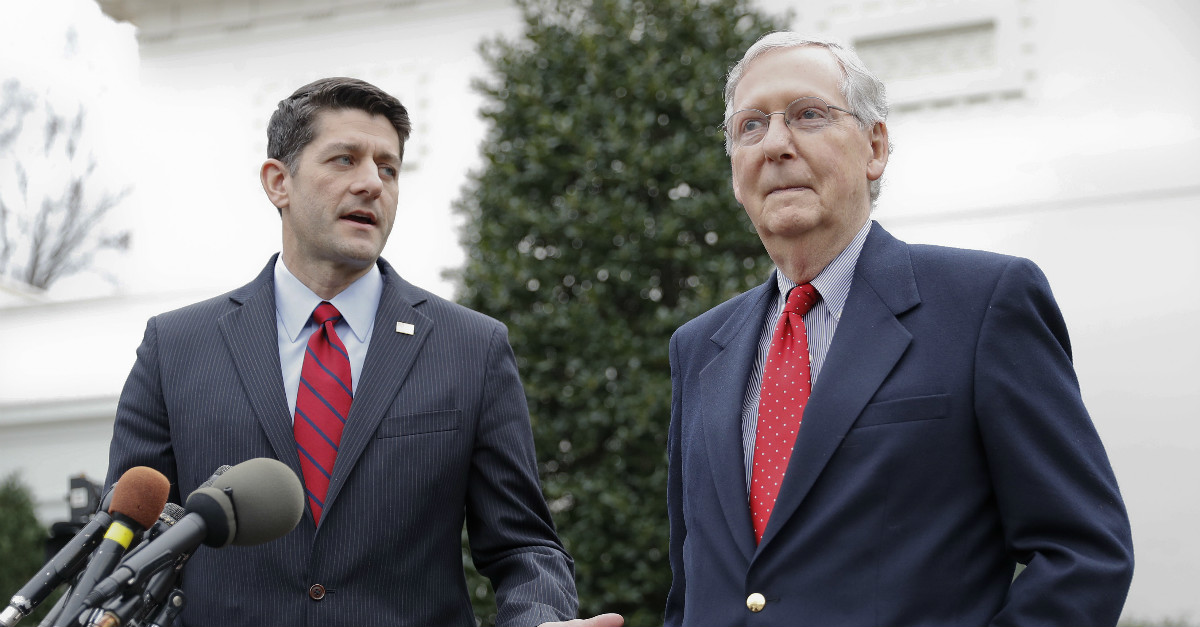I might be the most naive person in Washington.
Videos by Rare
Back during the Obama administration when the tea party was demanding budget cuts and Republican leadership was coming back with empty hands, I sympathized, if only slightly, with John Boehner’s predicament. Democrats controlled the presidency, after all, and Obama had proven to be a cunning foe, backstabbing Boehner during their initial negotiations in 2011 and holding the line thereafter.
But surely, I consoled myself, if the GOP won the presidency in 2016, then—then!—we would finally be able to shrink the federal government.
We now have a Republican president, a Republican Congress, Republican governorships, Republican state legislatures, yet out of the flame wall of what we’re assured were “weeks of intense negotiations” over keeping the government open has emerged an emaciated Paul Ryan and Mitch McConnell with a budget that isn’t even a compromise so much as a willing, gleeful capitulation. In command of the most untrammeled political power it’s wielded in 12 years and unshadowed by a looming election, the GOP has chosen once again to whiff on fiscal responsibility, raising the question: if not now, when?
RELATED: Republicans have nothing to gain and everything to lose from a government shutdown
This budget is bipartisanship in the old-fashioned sense: Republicans get the spending hikes they want, Democrats get the spending hikes they want, and everyone adjourns for a team-building session of bludgeoning taxpayers with polo mallets. Republicans have scored an additional $15 billion in defense money and $1.5 billion for border security. Democrats can crow about $30 billion more in non-defense spending, including fresh appropriations for the National Institutes of Health and renewable energy. Further money is reserved for a bailout of Puerto Rico, plans to fight opioid abuse and Amtrak. Planned Parenthood is funded; Donald Trump’s border wall with Mexico is not.
Some of those initiatives, especially the ones for opioid treatment, aren’t necessarily bad ideas. But the clarion message here is that congressional appropriators don’t have to set priorities, phasing out stale and ineffective programs in exchange for new ones. Nothing ever needs to change. Mick Mulvaney’s strained but admirable blueprint for domestic budget cuts from earlier this year has been discarded. The tea party, always an insurgency even after winning the 2010 election for the GOP, has again been notified that leadership regards it as the most expendable bloc of the Republican governing coalition, with the head of the table reserved for defense hawks and oinking appropriators.
It’s Democrats who are elated over this budget. They’ve long telegraphed that they’re perfectly copacetic with GOP spending priorities so long as they’re permitted their own profligate orgies on the domestic side. This budget codifies that imbalance into the fiscal policy of the United States. Hence a gushing Chuck Schumer: “This agreement is a good agreement for the American people, and takes the threat of a government shutdown off the table.” With his party having faced a Carthaginian electoral annihilation last November, there’s no way he should sound that pleased.
RELATED: Why Trump’s military budget will encourage more war
Under the Paleolithic rules of the United States Senate, Democrats were needed to pass any budget despite the Republican majority there, but that didn’t mean it had to end up this way. Republicans could have set as a red line X billion in spending reductions, then haggled with Democrats to find deep cuts in exchange for any other priorities for which they wanted more funding, while themselves allowing military spending to at least break even. They could have at least tried to be fiscally conservative. They might have even had the gumption to stipulate entitlement reform, given how profusely those programs are hemorrhaging money and how easy the fixes are at least on the Social Security side.
They did none of that. They instead accomplished two things: 1.) further inflaming our Spain-sized debt-to-GDP ratio, and 2.) proving Purple’s Law of Political Cravenness: Republicans are a majority party that function like they’re in the minority and Democrats are a minority party that function like they’re in the majority. Ah, but an objection arises. Maybe Republicans are behaving like a majority party: they just never gave a damn about cutting spending in the first place. My quest to get my name in all the political science textbooks has thus been foiled.



